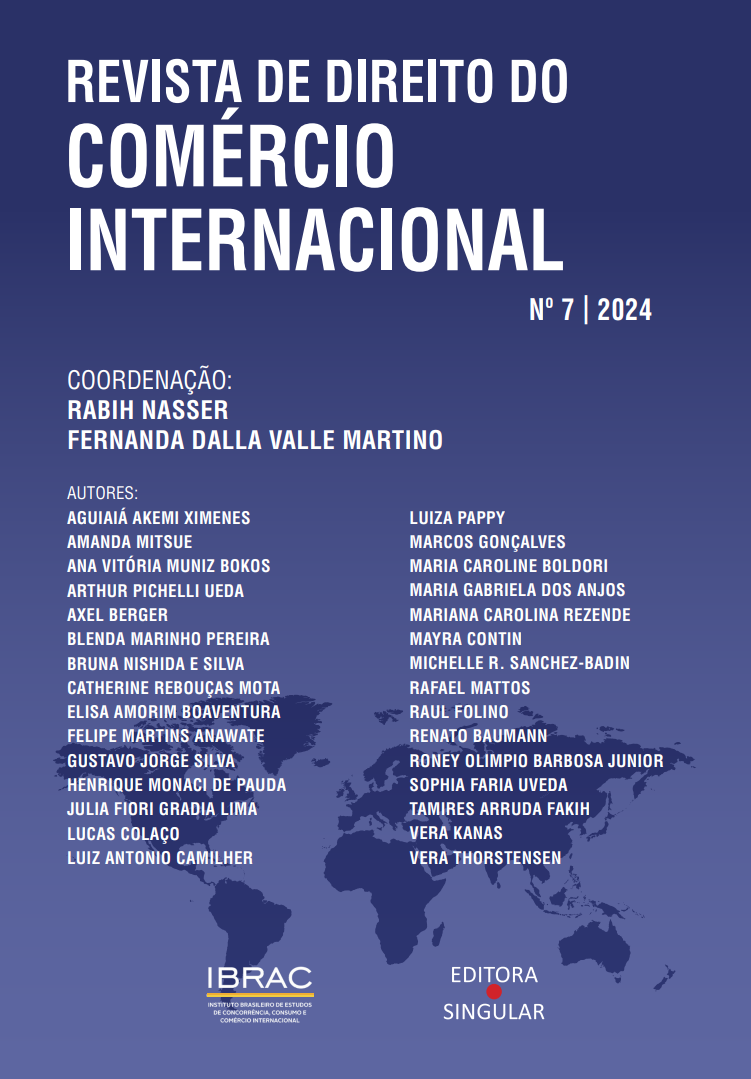Neoprotecionismo e mudanças nas estruturas das cadeias globais de valor qual o papel do G20?
Main Article Content
Abstract
The article discusses the G20’s role in addressing neoprotectionism and changes in global value chains (GVCs). The central argument is that recent events, such as pandemics, geopolitical conflicts, and climate change, have driven neoprotectionist practices, negatively impacting trade cooperation. There is a particular focus on the semiconductor sector, where measures like the U.S. Chips Act and China’s Made in China 2025 have intensified technological competition. Therefore, the article proposes that the G20 promote international cooperation, transparency, and inclusive policies to address these challenges and build more sustainable GVCs.
Article Details
References
CANUTO, Otaviano; AIT ALI, Abdelaaziz; ARBOUCH, Mahmoud. GVCs, Resilience, and Efficiency Considerations: Improving Trade and Industrial Policy Design and Coordination. Policy Center for the New South, 2023. Disponível em: https://www.policycenter.ma/publications/gvcs-resilience-and-efficiency-considerations-improving-trade-and-industrial-policy.
AIGINGER, Karl; KETELS, Christian. Industrial Policy Reloaded. Journal of Industry, Competition and Trade, 2024. Disponível em: https://doi.org/10.1007/s10842-024-00415-8.
MERCURIO, Bryan. The Demise of Globalization and Rise of Industrial Policy: Caveat Emptor. World Trade Review, v. 23, p. 242–250, 2024. Disponível em: https://www.cambridge.org/core/journals/world-trade-review/article/demise-of-globalization-and-rise-of-industrial-policy-caveat-emptor/EC824BEC9050139C100026BCC3639FC3.
CHERIF, Reda; HASANOV, Fuad. The Pitfalls of Protectionism: Import Substitution vs. Export-Oriented Industrial Policy. IMF, 2024. Disponível em: https://www.imf.org/en/Publications/WP/Issues/2024/04/26/The-Pitfalls-of-Protectionism-Import-Substitution-vs-546349.
EVENETT, Simon; JAKUBIK, Adam; MARTÍN, Fernando; RUTA, Michele. The Return of Industrial Policy in Data. IMF, 2024. Disponível em: https://www.imf.org/en/Publications/WP/Issues/2023/12/23/The-Return-of-Industrial-Policy-in-Data-542828.
KHAN, Saif M.; ALEXANDER, Mann; PETERSON, Dahlia. The Semiconductor Supply Chain: Assessing National Competitiveness. Center for Security and Emerging Technology, 2021. Disponível em: https://cset.georgetown.edu/publication/the-semiconductor-supply-chain/.
DADUSH, Uri. Deglobalisation and Protectionism. Bruegel, 2022. Disponível em: https://www.bruegel.org/working-paper/deglobalisation-and-protectionism.
GRIMES, Seamus; DU, Debin. China’s emerging role in the global semiconductor value chain. Telecommunications Policy, v. 46, n. 2, 2022. Disponível em: https://doi.org/10.1016/j.telpol.2020.101959.
MALKIN, Antony; TIAN, H. The geoeconomics of global semiconductor value chains: extraterritoriality and the US-China technology rivalry. Review of International Political Economy, v. 31, n. 2, p. 674–699, 2023. Disponível em: https://doi.org/10.1080/09692290.2023.2245404x.
